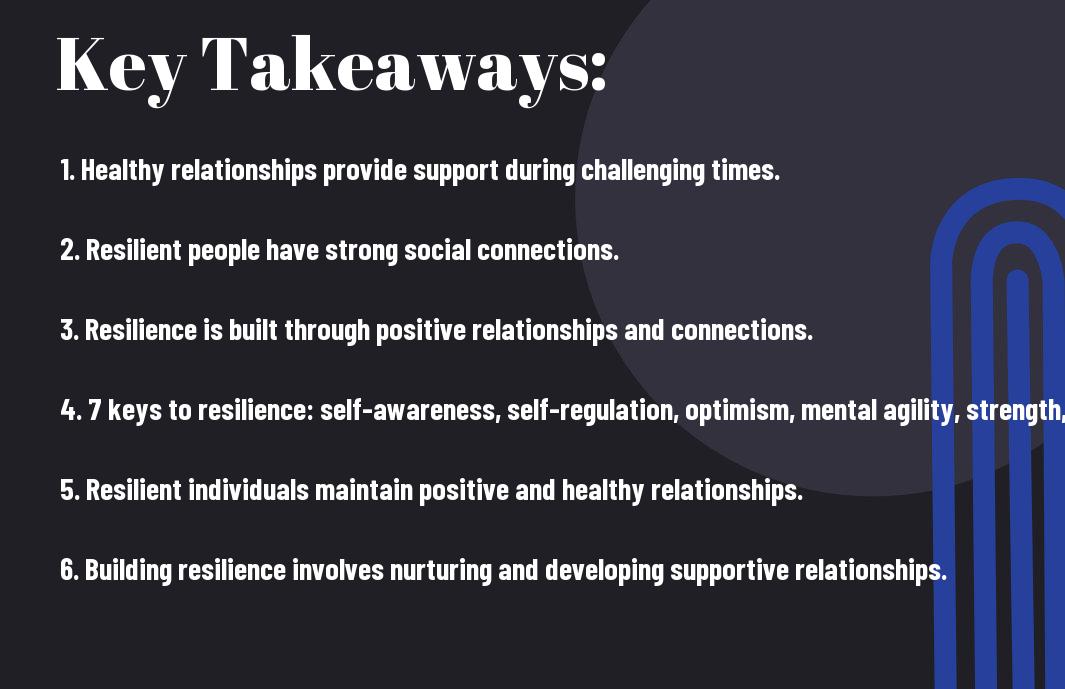Most experts agree that healthy relationships play a crucial role in building resilience. The ability to bounce back from setbacks and challenges is greatly influenced by the quality of our connections with others. Research has shown that individuals with strong support systems are better equipped to navigate life’s ups and downs. So, what are the key factors that contribute to resilience? Here are the 7 keys to resilience that can help you cultivate and strengthen your ability to adapt and thrive in the face of adversity.
Key Takeaways:
- Healthy relationships are crucial for building resilience as they provide emotional support, encouragement, and a sense of belonging.
- Resilience is the ability to bounce back from challenges and setbacks, and having strong relationships can help individuals navigate tough times more effectively.
- The 7 keys to resilience include self-awareness, self-regulation, optimism, mental agility, strengths of character, connection, and reaching out.
- Self-awareness allows individuals to recognize their emotions and reactions, which is crucial for managing stress and adversity.
- Building connections with others strengthens social support networks, fosters empathy, and provides a sense of community that boosts resilience in the face of adversity.

The Role of Healthy Relationships in Developing Resilience
Emotional Support and Stress Reduction
Now, relationships play a crucial role in developing resilience by providing emotional support and stress reduction. When faced with challenges, having a supportive network of friends, family, or mentors can help individuals navigate through tough times. These relationships offer a safe space for individuals to express their emotions, seek advice, and feel understood, ultimately reducing the negative impacts of stress on their mental and physical well-being.
Improved Self-Esteem and Self-Confidence
With healthy relationships, individuals experience improved self-esteem and self-confidence. Interactions with supportive and uplifting individuals can help boost self-worth and belief in one’s abilities. Positive feedback, encouragement, and validation from these relationships contribute to a more positive self-image, empowering individuals to overcome obstacles and setbacks with resilience and determination.
Developing a strong sense of self-worth and confidence through healthy relationships enables individuals to bounce back from challenges more effectively and approach life with a resilient mindset. Surrounding oneself with positive influences fosters a sense of empowerment and belief in one’s resilience, serving as a foundation for overcoming adversity and thriving in the face of obstacles.

The 7 Keys to Resilience
Developing a Positive Attitude
Not only does a positive attitude help in facing challenges with optimism and hope, but it also enhances one’s overall mental and emotional well-being. By focusing on the good, individuals can navigate difficulties more effectively and bounce back from setbacks.
Fostering a Growth Mindset
An necessary aspect of resilience is fostering a growth mindset, which involves seeing challenges as opportunities for growth and learning. Embracing this mindset allows individuals to adapt to change, develop new skills, and persevere in the face of adversity.
Building Strong Communication Skills
Strong communication skills are crucial for building resilience as they enable individuals to express their needs, seek support, and navigate conflicts effectively. By communicating openly and honestly, individuals can strengthen relationships and build a support system to help them through tough times.
Establishing Healthy Boundaries
It is important to establish boundaries to protect one’s physical, emotional, and mental well-being. By setting clear boundaries and communicating them effectively, individuals can prevent burnout, reduce stress, and cultivate healthier relationships.
Cultivating Social Support Networks
The presence of a strong social support network is key to resilience as it provides individuals with emotional support, guidance, and encouragement during challenging times. By nurturing relationships with family, friends, or support groups, individuals can feel more connected and better equipped to cope with stress.
Embracing Change and Adversity
Another crucial aspect of resilience is the ability to embrace change and adversity as opportunities for growth and personal development. By remaining flexible, adapting to new circumstances, and staying positive, individuals can navigate life’s ups and downs with resilience and grace.
Practicing Self-Care and Mindfulness
Boundaries are necessary when it comes to practicing self-care and mindfulness. Taking care of one’s physical, emotional, and mental health is crucial for building resilience and coping with stress. By prioritizing self-care practices such as exercise, meditation, and setting aside time for relaxation, individuals can recharge and maintain their well-being.
Strategies to Enhance Healthy Relationships and Resilience
Effective Communication Techniques
On the journey to building resilience through healthy relationships, effective communication plays a crucial role. It is vital to actively listen to your partner, show empathy, and express yourself clearly and honestly. By fostering open and honest communication, you can strengthen the bond with your loved ones and navigate challenges more effectively.
Conflict Resolution and Problem-Solving Skills
The ability to resolve conflicts and solve problems is vital for maintaining healthy relationships and enhancing resilience. The key is to approach conflicts with a solution-focused mindset, seeking mutually beneficial outcomes rather than aiming to ‘win’ the argument. By developing strong problem-solving skills, you can address issues constructively and prevent them from escalating.
Plus, recognizing that conflicts are a natural part of any relationship helps in approaching them with a positive attitude. Embracing differences, being willing to compromise, and seeking common ground are vital components of effective conflict resolution.
Summing up
On the whole, healthy relationships are necessary for building resilience because they provide emotional support, encouragement, and a sense of belonging. The 7 keys to resilience include self-awareness, self-care, positive relationships, problem-solving skills, emotional regulation, optimism, and a sense of purpose. By cultivating these key aspects in our lives and fostering healthy relationships, we can better navigate through life’s challenges and bounce back from adversity with strength and determination. Building resilience is a journey, but with the right tools and support system in place, we can overcome obstacles and thrive in the face of adversity.
FAQ
Q: Why are healthy relationships imperative for building resilience?
A: Healthy relationships provide emotional support, a sense of belonging, and encouragement during tough times, all of which are crucial for developing resilience. When you have a strong support system, you are better equipped to bounce back from setbacks and navigate challenges effectively.
Q: What are the 7 keys to resilience?
A: The 7 keys to resilience are: 1) Self-awareness, 2) Self-regulation, 3) Optimism, 4) Mental agility, 5) Strengths of character, 6) Connection, and 7) Stress management. These factors work together to help individuals effectively cope with adversity and thrive in the face of challenges.
Q: How does self-awareness contribute to resilience?
A: Self-awareness is the foundation of resilience as it allows individuals to recognize their emotions, thoughts, and reactions to stress. By understanding themselves better, they can develop coping strategies, seek support when needed, and adapt more effectively to difficult situations.
Q: Why is optimism considered a key component of resilience?
A: Optimism enables individuals to maintain a positive outlook, even in challenging circumstances. By believing in their ability to overcome obstacles and viewing setbacks as temporary, people with optimism are more likely to persevere, problem-solve creatively, and bounce back from adversity.
Q: How can connection with others enhance resilience?
A: Building and nurturing relationships with others can provide social support, empathy, and a sense of belonging – all of which are imperative for developing resilience. Connecting with others helps individuals feel understood, validated, and cared for, making it easier to face life’s challenges with strength and determination.